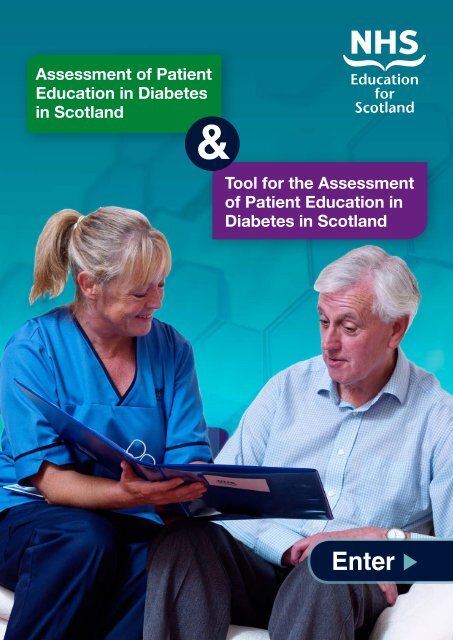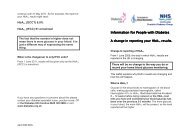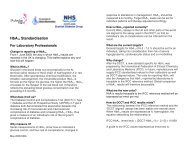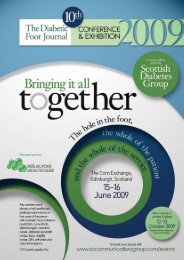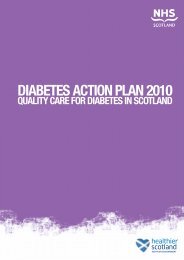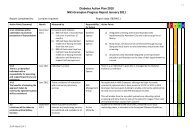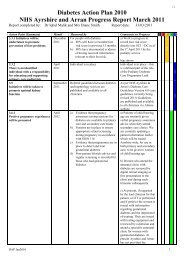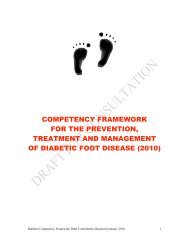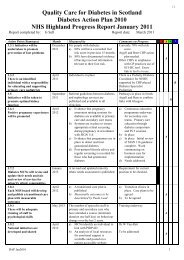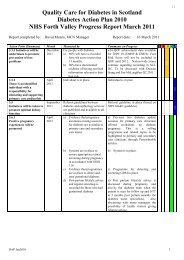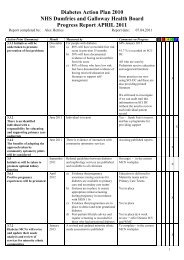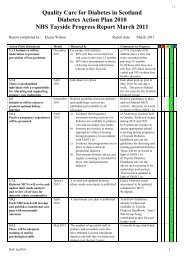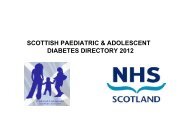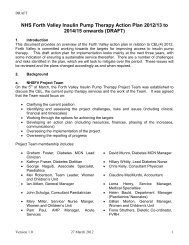Tool for the Assessment of Patient Education in Diabetes in Scotland ...
Tool for the Assessment of Patient Education in Diabetes in Scotland ...
Tool for the Assessment of Patient Education in Diabetes in Scotland ...
Create successful ePaper yourself
Turn your PDF publications into a flip-book with our unique Google optimized e-Paper software.
<strong>Assessment</strong> <strong>of</strong> <strong>Patient</strong><br />
<strong>Education</strong> <strong>in</strong> <strong>Diabetes</strong><br />
<strong>in</strong> <strong>Scotland</strong><br />
<strong>Tool</strong> <strong>for</strong> <strong>the</strong> <strong>Assessment</strong><br />
<strong>of</strong> <strong>Patient</strong> <strong>Education</strong> <strong>in</strong><br />
<strong>Diabetes</strong> <strong>in</strong> <strong>Scotland</strong>
Contents<br />
<strong>Assessment</strong> <strong>of</strong> <strong>Patient</strong> <strong>Education</strong> <strong>in</strong> <strong>Diabetes</strong> <strong>in</strong> <strong>Scotland</strong><br />
Introduction...................................................................................................................1<br />
NICE criteria <strong>for</strong> structured education.........................................................................2<br />
Philosophy..................................................................................................................2<br />
Written curriculum.......................................................................................................2<br />
Aims and Learn<strong>in</strong>g Outcomes....................................................................................3<br />
Tra<strong>in</strong>ed Educator........................................................................................................3<br />
Quality Assurance.......................................................................................................4<br />
Audit............................................................................................................................5<br />
<strong>Tool</strong> <strong>for</strong> <strong>the</strong> <strong>Assessment</strong> <strong>of</strong> <strong>Patient</strong> <strong>Education</strong> <strong>in</strong> <strong>Diabetes</strong><br />
<strong>in</strong> <strong>Scotland</strong><br />
Introduction...................................................................................................................7<br />
Philosophy.....................................................................................................................7<br />
Curriculum, Aims and Learn<strong>in</strong>g Outcomes................................................................7<br />
Tra<strong>in</strong>ed Educator...........................................................................................................7<br />
Quality Assurance.........................................................................................................8<br />
Audit...............................................................................................................................8<br />
References.................................................................................................................. 10<br />
Appendix......................................................................................................................11<br />
Acknowledgements................................................................................................... 12<br />
© NHS <strong>Education</strong> <strong>for</strong> <strong>Scotland</strong> 2012. You can copy or reproduce <strong>the</strong> <strong>in</strong><strong>for</strong>mation <strong>in</strong> this<br />
document <strong>for</strong> use with<strong>in</strong> NHS<strong>Scotland</strong> and <strong>for</strong> non‐commercial educational purposes.<br />
Use <strong>of</strong> this document <strong>for</strong> commercial purposes is permitted only with <strong>the</strong> written<br />
permission <strong>of</strong> NES.
<strong>Assessment</strong> <strong>of</strong> <strong>Patient</strong> <strong>Education</strong><br />
<strong>in</strong> <strong>Diabetes</strong> <strong>in</strong> <strong>Scotland</strong><br />
ASSESSMENT OF PATIENT EDUCATION IN DIABETES IN SCOTLAND
Introduction<br />
The Scottish <strong>Diabetes</strong> Action Plan 1 endorsed<br />
<strong>the</strong> recommendations <strong>of</strong> SIGN 116 2 regard<strong>in</strong>g<br />
structured patient education with<strong>in</strong> <strong>Scotland</strong>.<br />
Structured education is central to diabetes<br />
care and to <strong>the</strong> self management <strong>of</strong> long<br />
term conditions. Moreover, people liv<strong>in</strong>g<br />
with diabetes have stated that structured<br />
education was <strong>the</strong> most valued type <strong>of</strong><br />
education. It is <strong>the</strong> aim <strong>of</strong> <strong>the</strong> Scottish<br />
<strong>Diabetes</strong> Action Plan that people with<br />
diabetes receive a structured education<br />
programme that fulfils <strong>the</strong> nationally agreed<br />
criteria from <strong>the</strong> time <strong>of</strong> diagnosis with annual<br />
review and have access to ongo<strong>in</strong>g education<br />
result<strong>in</strong>g <strong>in</strong> an <strong>in</strong>crease <strong>in</strong> <strong>the</strong> percentage<br />
<strong>of</strong> people participat<strong>in</strong>g <strong>in</strong> self management<br />
programmes that will be recorded on SCI-<br />
<strong>Diabetes</strong> and reported <strong>for</strong> <strong>the</strong> Scottish<br />
<strong>Diabetes</strong> Survey.<br />
The def<strong>in</strong>ition <strong>of</strong> a structured patient<br />
education programme accord<strong>in</strong>g to NICE 3 is:<br />
“a planned and graded programme that<br />
is comprehensive <strong>in</strong> scope, flexible <strong>in</strong><br />
content, responsive to an <strong>in</strong>dividual’s<br />
cl<strong>in</strong>ical and psychological needs and<br />
adaptable to his or her educational and<br />
cultural background.”<br />
The aim <strong>of</strong> patient education is <strong>for</strong> people<br />
with diabetes to improve <strong>the</strong>ir knowledge,<br />
skills and confidence, enabl<strong>in</strong>g <strong>the</strong>m to take<br />
<strong>in</strong>creas<strong>in</strong>g control <strong>of</strong> <strong>the</strong>ir own condition and<br />
<strong>in</strong>tegrate effective self-management <strong>in</strong>to <strong>the</strong>ir<br />
daily lives.<br />
Moreover, NICE recommend that:<br />
“structured patient education is made<br />
available to all people with diabetes at<br />
<strong>the</strong> time <strong>of</strong> <strong>in</strong>itial diagnosis and <strong>the</strong>n as<br />
required on an ongo<strong>in</strong>g basis, based on a<br />
<strong>for</strong>mal, regular assessment <strong>of</strong> need.”<br />
The current document aims to def<strong>in</strong>e <strong>the</strong><br />
process adopted with<strong>in</strong> <strong>Scotland</strong> to assess<br />
patient education provision accord<strong>in</strong>g to <strong>the</strong><br />
<strong>Diabetes</strong> Action Plan 1 thus ensur<strong>in</strong>g that<br />
people with diabetes, and/or <strong>the</strong>ir carers,<br />
receive a structured education programme<br />
that fulfils <strong>the</strong> nationally agreed criteria. The<br />
document is written <strong>for</strong> pr<strong>of</strong>essional health<br />
care workers deliver<strong>in</strong>g patient education.<br />
It is acknowledged that patients can also<br />
deliver patient education and <strong>the</strong> follow<strong>in</strong>g<br />
criteria would also apply to patient led<br />
structured education.<br />
The criteria that def<strong>in</strong>e a structured education<br />
programme are:<br />
1. A philosophy<br />
2. An evidence based curriculum<br />
3. Aims and learn<strong>in</strong>g outcomes<br />
4. Delivered by a tra<strong>in</strong>ed educator<br />
5. Quality Assured<br />
6. Audited<br />
Each Health Board should have a Managed<br />
Cl<strong>in</strong>ical Network (MCN) responsible <strong>for</strong><br />
diabetes care. Each MCN is charged<br />
with ensur<strong>in</strong>g <strong>the</strong> provision <strong>of</strong> a range <strong>of</strong><br />
educational solutions that should <strong>in</strong>clude<br />
quality assured structured education <strong>for</strong><br />
people with diabetes. Each MCN ma<strong>in</strong>ta<strong>in</strong>s<br />
records <strong>of</strong> educational provision and reports<br />
<strong>the</strong>ir progress towards meet<strong>in</strong>g this standard<br />
to <strong>the</strong> Scottish <strong>Diabetes</strong> Group.<br />
1<br />
ASSESSMENT OF PATIENT EDUCATION IN DIABETES IN SCOTLAND
NICE 3 criteria <strong>for</strong> structured education<br />
1. Philosophy<br />
The structured education programme has<br />
a clearly stated philosophy that reflects <strong>the</strong><br />
beliefs, attitudes and values <strong>of</strong> <strong>the</strong> people<br />
with diabetes <strong>for</strong> which <strong>the</strong> course is aimed,<br />
and <strong>the</strong> pr<strong>of</strong>essionals deliver<strong>in</strong>g <strong>the</strong> course.<br />
In <strong>Scotland</strong>, a strong philosophy <strong>of</strong> self<br />
management and life long learn<strong>in</strong>g <strong>for</strong><br />
people liv<strong>in</strong>g with a long term condition, like<br />
diabetes, is develop<strong>in</strong>g 4 . <strong>Patient</strong> education<br />
should promote person centered care, self<br />
management and active behaviour change.<br />
The philosophy <strong>of</strong> an education programme<br />
should be developed <strong>in</strong> conjunction with <strong>the</strong><br />
people <strong>for</strong> whom <strong>the</strong> course is aimed and<br />
will adopt an equal and diverse approach<br />
that is appropriate to <strong>the</strong> patient regardless<br />
<strong>of</strong> geographical location, age, gender,<br />
race, religion, creed, disability, social class,<br />
sexuality, culture and life circumstances.<br />
The philosophy should be type specific<br />
and appropriate <strong>for</strong> <strong>the</strong> age group and<br />
educational abilities <strong>of</strong> <strong>the</strong> persons attend<strong>in</strong>g.<br />
Partners and carers should be <strong>in</strong>cluded <strong>in</strong><br />
<strong>the</strong> education process where appropriate.<br />
To engage with patients <strong>in</strong> writ<strong>in</strong>g a<br />
philosophy, pr<strong>of</strong>essionals are encouraged<br />
to hold focus groups or directed discussions<br />
with patients and <strong>the</strong>ir carers. <strong>Patient</strong>s<br />
may even lead <strong>the</strong> development <strong>of</strong> <strong>the</strong><br />
educational philosophy if asked so to do.<br />
2. Written curriculum<br />
Any diabetes education programme requires<br />
a written curriculum encompass<strong>in</strong>g:<br />
• <strong>the</strong> philosophy<br />
• evidence based course content<br />
• aims and learn<strong>in</strong>g outcomes<br />
• lesson plans <strong>for</strong> each session<br />
• <strong>in</strong>tended participants<br />
• evidence <strong>of</strong> educational <strong>the</strong>ory appropriate<br />
to <strong>the</strong> <strong>in</strong>tended participants<br />
• evidence <strong>of</strong> learn<strong>in</strong>g activities appropriate<br />
to <strong>the</strong> <strong>in</strong>tended participants<br />
• method <strong>of</strong> assessment<br />
• resources to deliver <strong>the</strong> course<br />
It is best practice to have one named<br />
person, an <strong>Education</strong>al Lead, who is overall<br />
responsible <strong>for</strong> <strong>the</strong> programme while work<strong>in</strong>g<br />
with<strong>in</strong> a team. All educational resources<br />
should be kept up to date, collated and easily<br />
accessible by all members <strong>of</strong> <strong>the</strong> educator<br />
team. The curriculum content is <strong>in</strong>dicative<br />
ra<strong>the</strong>r than prescriptive and <strong>the</strong>re should be a<br />
system to <strong>of</strong>fer follow up topics not covered <strong>in</strong><br />
<strong>the</strong> programme but requested by <strong>in</strong>dividuals,<br />
hence accord<strong>in</strong>g to need. This may take<br />
<strong>the</strong> <strong>for</strong>m <strong>of</strong> a signpost<strong>in</strong>g system to leaflets,<br />
resources, o<strong>the</strong>r educational sessions, o<strong>the</strong>r<br />
services or <strong>the</strong> person may require one to<br />
one support <strong>for</strong> a particular issue.<br />
NICE CRITERIA FOR STRUCTURED EDUCATION 2
3. Aims and learn<strong>in</strong>g outcomes<br />
The programme should have an overall<br />
aim and objectives that are expanded and<br />
developed through each session <strong>for</strong> which<br />
fur<strong>the</strong>r aims and learn<strong>in</strong>g outcomes should<br />
be written.<br />
The level <strong>of</strong> learn<strong>in</strong>g and <strong>in</strong>tended outcomes<br />
should <strong>in</strong>corporate <strong>the</strong> learn<strong>in</strong>g needs <strong>of</strong> <strong>the</strong><br />
participants and should build on previous<br />
knowledge, skills and experiences <strong>of</strong> <strong>the</strong><br />
participants.<br />
4. Tra<strong>in</strong>ed Educator<br />
All normal Human Resource issues apply<br />
around <strong>the</strong> employment and deployment<br />
<strong>of</strong> staff. All staff have a job description that<br />
meets <strong>the</strong> Knowledge and Skills Framework.<br />
All staff have a Pr<strong>of</strong>essional Development<br />
Plan through which <strong>the</strong>ir own learn<strong>in</strong>g and<br />
developmental needs are identified and<br />
<strong>the</strong> meet<strong>in</strong>g <strong>of</strong> <strong>the</strong>se facilitated. Records<br />
are reta<strong>in</strong>ed by staff and l<strong>in</strong>e managers <strong>of</strong><br />
<strong>the</strong>se and, if appropriate, Human Resources<br />
Departments.<br />
There are nationally agreed competency<br />
frameworks <strong>for</strong> nurses, dietitians and<br />
podiatrists work<strong>in</strong>g <strong>in</strong> diabetes care 5, 6, 7 . The<br />
Scottish <strong>Diabetes</strong> <strong>Education</strong> Advisory Group<br />
recommends that <strong>the</strong>se documents are<br />
used <strong>for</strong> <strong>the</strong> appropriate recruitment <strong>of</strong> staff.<br />
Prior to deliver<strong>in</strong>g any patient education, it<br />
is essential that <strong>the</strong> pr<strong>of</strong>essional must have<br />
knowledge <strong>of</strong> diabetes, experience <strong>of</strong> work<strong>in</strong>g<br />
with people with diabetes as well as meet<strong>in</strong>g<br />
<strong>the</strong> requirements <strong>of</strong> a tra<strong>in</strong>ed educator.<br />
It is recommended that pr<strong>of</strong>essionals are<br />
mentored by a more experienced practitioner<br />
<strong>the</strong> first time that <strong>the</strong>y provide an educational<br />
programme. Where mentor<strong>in</strong>g is not possible,<br />
pr<strong>of</strong>essionals are encouraged to ma<strong>in</strong>ta<strong>in</strong> a<br />
written reflective log <strong>of</strong> each session.<br />
The knowledge and skills <strong>of</strong> a tra<strong>in</strong>ed<br />
educator are detailed below:<br />
1. Write a philosophy <strong>of</strong> education<br />
2. Write aims and learn<strong>in</strong>g outcomes<br />
3. Identify tra<strong>in</strong><strong>in</strong>g and educational<br />
opportunities<br />
4. Identify patient and carers learn<strong>in</strong>g and<br />
development needs<br />
5. Develop an educational session that<br />
engages and supports patients <strong>in</strong> <strong>the</strong>ir<br />
learn<strong>in</strong>g and development<br />
6. Deliver an educational session that<br />
engages and supports patients <strong>in</strong> <strong>the</strong>ir<br />
learn<strong>in</strong>g and development – <strong>in</strong>clud<strong>in</strong>g<br />
presentation skills, facilitation <strong>of</strong> learn<strong>in</strong>g<br />
and development, question<strong>in</strong>g skills<br />
7. Prepare and use PowerPo<strong>in</strong>t slides/<br />
slides/overhead/visual resources as part<br />
<strong>of</strong> an educational session<br />
8. Teach a skill e.g. blood glucose<br />
monitor<strong>in</strong>g<br />
9. Manage learn<strong>in</strong>g and development <strong>in</strong><br />
groups<br />
10. Evaluate <strong>the</strong> learn<strong>in</strong>g <strong>of</strong> patients after an<br />
educational session<br />
3<br />
ASSESSMENT OF PATIENT EDUCATION IN DIABETES IN SCOTLAND
11. Improve learn<strong>in</strong>g and development<br />
provision<br />
12. Reflect on, develop and ma<strong>in</strong>ta<strong>in</strong> own<br />
skills and practice <strong>in</strong> learn<strong>in</strong>g and<br />
development.<br />
It is recommended that <strong>the</strong> <strong>Education</strong>al<br />
Lead, who has overall responsibility <strong>for</strong><br />
<strong>the</strong> programme, is able to demonstrate<br />
all <strong>the</strong> above knowledge and skills (1-12).<br />
Those who are <strong>in</strong>volved <strong>in</strong> deliver<strong>in</strong>g patient<br />
education, but not necessarily <strong>in</strong>volved <strong>in</strong> 1-5<br />
above, are required to demonstrate 6-12 as<br />
well as <strong>the</strong>ir understand<strong>in</strong>g and application<br />
<strong>of</strong> <strong>the</strong> philosophy to <strong>the</strong>ir teach<strong>in</strong>g and<br />
adapt<strong>in</strong>g <strong>the</strong>ir own teach<strong>in</strong>g styles to meet<br />
<strong>the</strong> philosophy. It is <strong>the</strong> responsibility <strong>of</strong> <strong>the</strong><br />
<strong>Education</strong>al Lead to ensure that only people<br />
with <strong>the</strong> necessary knowledge and skills are<br />
<strong>in</strong>volved <strong>in</strong> deliver<strong>in</strong>g patient education.<br />
It is acknowledged that pr<strong>of</strong>essionals are<br />
required to have many skills <strong>in</strong> car<strong>in</strong>g <strong>for</strong><br />
people with diabetes. The cl<strong>in</strong>ical and<br />
educational skills required will vary accord<strong>in</strong>g<br />
to <strong>the</strong> patient’s journey and <strong>the</strong>ir stage on this<br />
journey utiliz<strong>in</strong>g <strong>the</strong> educational framework<br />
<strong>of</strong> <strong>the</strong> short life work<strong>in</strong>g group on type 1<br />
diabetes 8 (Appendix 1).<br />
All staff who are <strong>in</strong>volved <strong>in</strong> support<strong>in</strong>g<br />
people with diabetes and also <strong>in</strong> deliver<strong>in</strong>g<br />
patient education are encouraged to develop<br />
<strong>the</strong> follow<strong>in</strong>g skills us<strong>in</strong>g <strong>the</strong>ir annual<br />
Per<strong>for</strong>mance and Development Plan as a tool<br />
towards acquir<strong>in</strong>g <strong>the</strong>m:<br />
• robust consultative communication skills<br />
• skills <strong>in</strong> promot<strong>in</strong>g behaviour change<br />
• <strong>the</strong> ability to conduct peer review<br />
• facilitation skills<br />
• motivational <strong>in</strong>terview<strong>in</strong>g<br />
• skills <strong>in</strong> promot<strong>in</strong>g decision mak<strong>in</strong>g<br />
• skills <strong>in</strong> promot<strong>in</strong>g self care and<br />
management<br />
5. Quality Assurance<br />
The purpose <strong>of</strong> quality assurance is to<br />
ensure <strong>the</strong> highest standard <strong>of</strong> delivery<br />
<strong>for</strong> all educational programmes to meet<br />
<strong>the</strong>ir <strong>in</strong>tended audience <strong>in</strong> relation to its<br />
philosophy, aims and learn<strong>in</strong>g outcomes.<br />
Specific aspects <strong>of</strong> each educational<br />
programme or session will be evaluated<br />
and <strong>the</strong> detail is def<strong>in</strong>ed under <strong>the</strong> head<strong>in</strong>g<br />
‘Audit’.<br />
Ultimately it is <strong>the</strong> responsibility <strong>of</strong> each<br />
Health Board to ensure that patient care is<br />
quality assured. The outcomes <strong>of</strong> quality<br />
assur<strong>in</strong>g educational programmes and<br />
educational sessions will be reported to <strong>the</strong><br />
relevant MCN who will report to <strong>the</strong> Health<br />
Board and, on behalf <strong>of</strong> <strong>the</strong> Health Board, to<br />
<strong>the</strong> Scottish <strong>Diabetes</strong> Group.<br />
Action plans will be derived as required.<br />
Specific cl<strong>in</strong>ical outcomes are currently<br />
recorded on SCI-<strong>Diabetes</strong> and <strong>the</strong> <strong>of</strong>fer to<br />
attend an educational course, participation<br />
or o<strong>the</strong>rwise will also be recorded. This data<br />
will be reported annually <strong>in</strong> an anonymous<br />
manner through <strong>the</strong> National <strong>Diabetes</strong><br />
Survey 9 .<br />
Written records (paper or electronic) <strong>of</strong> all<br />
aspects identified <strong>for</strong> quality assurance<br />
purposes will normally be reta<strong>in</strong>ed accord<strong>in</strong>g<br />
to <strong>the</strong> NHS Code <strong>of</strong> Practice 10 .<br />
TRAINED EDUCATOR<br />
4
6. Audit<br />
The outcomes from an educational<br />
programme should be regularly audited.<br />
It is acknowledged that specific cl<strong>in</strong>ical<br />
parameters are captured on SCI-<strong>Diabetes</strong>.<br />
It is our <strong>in</strong>tention that patient education<br />
<strong>of</strong>fered, attended and completed would also<br />
be recorded on SCI-<strong>Diabetes</strong>. At this stage,<br />
it is acknowledged that data cannot normally<br />
be collected regularly <strong>for</strong> people who attend a<br />
‘one <strong>of</strong>f’ teach<strong>in</strong>g session.<br />
It is recommended that <strong>the</strong> written curriculum<br />
is reviewed at a m<strong>in</strong>imum <strong>of</strong> every second<br />
year <strong>for</strong> its reliability, validity, relevance and<br />
comprehensiveness although it is expected to<br />
be responsive to new research or <strong>in</strong>novations<br />
and adapted accord<strong>in</strong>gly.<br />
<strong>Patient</strong> education will be undertaken <strong>in</strong> a<br />
variety <strong>of</strong> sett<strong>in</strong>gs and through different<br />
media e.g. tele-medic<strong>in</strong>e. For each venue<br />
utilized, <strong>the</strong>re should be procedures <strong>for</strong><br />
deal<strong>in</strong>g with emergencies dur<strong>in</strong>g programme<br />
delivery where possible.<br />
For each educational programme that a<br />
patient attends, specific data should be<br />
collected that is expanded <strong>in</strong> The <strong>Tool</strong> <strong>for</strong><br />
<strong>Assessment</strong> <strong>of</strong> <strong>Patient</strong> <strong>Education</strong> <strong>in</strong> <strong>Diabetes</strong><br />
<strong>in</strong> <strong>Scotland</strong> (TAPEDS).<br />
Each MCN should reta<strong>in</strong> <strong>in</strong><strong>for</strong>mation on those<br />
provid<strong>in</strong>g patient education <strong>in</strong>clud<strong>in</strong>g: name,<br />
job title, qualifications that meet <strong>the</strong> skills<br />
identified <strong>for</strong> <strong>the</strong> role <strong>of</strong> a tra<strong>in</strong>ed educator,<br />
date <strong>of</strong> peer review or when self reflection<br />
was undertaken.<br />
5 ASSESSMENT OF PATIENT EDUCATION IN DIABETES IN SCOTLAND
<strong>Tool</strong> <strong>for</strong> <strong>the</strong> <strong>Assessment</strong> <strong>of</strong> <strong>Patient</strong><br />
<strong>Education</strong> <strong>in</strong> <strong>Diabetes</strong> <strong>in</strong> <strong>Scotland</strong><br />
TOOL FOR THE ASSESSMENT OF PATIENT EDUCATION IN DIABETES IN SCOTLAND 6
Introduction<br />
The follow<strong>in</strong>g checklist has been derived to assess patient education as meet<strong>in</strong>g <strong>the</strong> NICE<br />
criteria <strong>for</strong> structured patient education.<br />
The criteria that def<strong>in</strong>e a structured<br />
education programme are:<br />
1. A written philosophy<br />
2. An evidence based written curriculum<br />
3. Written aims and learn<strong>in</strong>g outcomes<br />
4. Delivered by a tra<strong>in</strong>ed educator<br />
5. Quality Assured<br />
6. Audited<br />
For each Programme submitted <strong>for</strong><br />
review please provide written evidence<br />
on <strong>the</strong> follow<strong>in</strong>g programme structure:<br />
• The name <strong>of</strong> <strong>the</strong> Programme<br />
• The name <strong>of</strong> <strong>the</strong> <strong>Education</strong>al Lead who<br />
is also responsible <strong>for</strong> updat<strong>in</strong>g <strong>the</strong><br />
curriculum.<br />
• If this is a national programme (e.g.<br />
DAFNE, DESMOND, X-PERT <strong>Diabetes</strong>)<br />
has it been modified <strong>in</strong> any way?<br />
If yes, detail <strong>the</strong> modifications: e.g.<br />
duration, tim<strong>in</strong>g, content, resources<br />
• The <strong>in</strong>tended target patient group<br />
• How <strong>the</strong> learn<strong>in</strong>g needs <strong>of</strong> <strong>the</strong> target<br />
patient group were identified<br />
• Names <strong>of</strong> all people participat<strong>in</strong>g <strong>in</strong><br />
deliver<strong>in</strong>g patient education: <strong>the</strong>ir<br />
pr<strong>of</strong>essional qualification and job title<br />
• Where all educational resources are<br />
reta<strong>in</strong>ed and how accessible <strong>the</strong>y are to all<br />
members <strong>of</strong> <strong>the</strong> health care team<br />
• Dates <strong>of</strong> <strong>the</strong> educational programme<br />
• Venue <strong>of</strong> <strong>the</strong> education: NHS site, private<br />
sector, non-NHS, patient’s home, via<br />
telemedic<strong>in</strong>e<br />
Please provide written evidence <strong>of</strong><br />
<strong>the</strong> follow<strong>in</strong>g:<br />
Philosophy<br />
• The philosophy <strong>of</strong> <strong>the</strong> programme<br />
• How patients were <strong>in</strong>volved <strong>in</strong> develop<strong>in</strong>g<br />
<strong>the</strong> philosophy<br />
• How <strong>the</strong> philosophy is communicated to<br />
and understood by patients, pr<strong>of</strong>essionals<br />
referr<strong>in</strong>g and educationalists deliver<strong>in</strong>g <strong>the</strong><br />
programme<br />
• How <strong>the</strong> philosophy supports<br />
self-management<br />
Curriculum, Aims and Learn<strong>in</strong>g<br />
Outcomes<br />
• The educational <strong>the</strong>ory appropriate to <strong>the</strong><br />
<strong>in</strong>tended participants<br />
• The evidence based course content<br />
• Aims and learn<strong>in</strong>g outcomes <strong>for</strong> each<br />
session<br />
• Lesson plans <strong>for</strong> each session<br />
• The learn<strong>in</strong>g activities appropriate to <strong>the</strong><br />
<strong>in</strong>tended participants<br />
• The method <strong>of</strong> assessment <strong>of</strong> learn<strong>in</strong>g<br />
• The resources used to deliver <strong>the</strong> course<br />
7 TOOL FOR THE ASSESSMENT OF PATIENT EDUCATION IN DIABETES IN SCOTLAND
Tra<strong>in</strong>ed Educator<br />
• How each pr<strong>of</strong>essional <strong>in</strong>volved <strong>in</strong><br />
deliver<strong>in</strong>g <strong>the</strong> programme meets <strong>the</strong><br />
requirements identified <strong>in</strong> <strong>the</strong> APEDS<br />
document.<br />
• Details <strong>of</strong> additional skills <strong>of</strong> <strong>the</strong><br />
pr<strong>of</strong>essionals <strong>in</strong>volved <strong>in</strong> deliver<strong>in</strong>g <strong>the</strong><br />
programme (APEDS page 4).<br />
• Details <strong>of</strong> mentorship provided to people<br />
who are <strong>in</strong>volved <strong>for</strong> <strong>the</strong> first time<br />
• Records <strong>of</strong> any peer reviews, external<br />
assessment or self reflection <strong>for</strong> all<br />
pr<strong>of</strong>essionals <strong>in</strong>volved <strong>in</strong> deliver<strong>in</strong>g patient<br />
education.<br />
Quality Assurance<br />
• Where and how written or electronic<br />
records are reta<strong>in</strong>ed regard<strong>in</strong>g patient<br />
education<br />
• <strong>Patient</strong> evaluation <strong>for</strong>ms<br />
• Evidence <strong>of</strong> peer review or self reflection<br />
on ability to teach o<strong>the</strong>rs.<br />
Audit<br />
<strong>Patient</strong> aspects<br />
• How quality <strong>of</strong> life is assessed:<br />
Is quality <strong>of</strong> life assessed with young<br />
people? If so, please state <strong>in</strong> what way<br />
it is assessed.<br />
Action taken as a result <strong>of</strong> <strong>the</strong> outcomes<br />
<strong>of</strong> <strong>the</strong> quality <strong>of</strong> life assessment<br />
What attempts are made to cont<strong>in</strong>ually<br />
assess patients’ knowledge and skills,<br />
pre and post education?<br />
How patient confidence to change<br />
behaviour is assessed<br />
How patient behaviour change is<br />
assessed<br />
How self management by patients is<br />
assessed<br />
How are <strong>the</strong> views <strong>of</strong> <strong>the</strong> participants<br />
acquired <strong>of</strong> <strong>the</strong> programme?<br />
What actions are taken as a<br />
consequence <strong>of</strong> participants<br />
responses?<br />
Pr<strong>of</strong>essional aspects<br />
• How each educator is evaluated by<br />
patients<br />
• How pr<strong>of</strong>essionals are facilitated to peer<br />
review each o<strong>the</strong>r<br />
• Evidence <strong>of</strong> self reflection by all staff<br />
<strong>in</strong>volved <strong>in</strong> deliver<strong>in</strong>g <strong>the</strong> programme 11, 12 .<br />
Organisational aspects<br />
• <strong>Patient</strong> attendance rates at <strong>the</strong> educational<br />
programme<br />
• <strong>Patient</strong> completion rates at <strong>the</strong> educational<br />
programme<br />
• Any identified accessibility issues<br />
• Date <strong>of</strong> last review <strong>of</strong> <strong>the</strong> written<br />
curriculum<br />
INTRODUCTION<br />
8
9 TOOL FOR THE ASSESSMENT OF PATIENT EDUCATION IN DIABETES IN SCOTLAND
References<br />
1. Scottish Government (2010) <strong>Diabetes</strong><br />
Action Plan 2010. The Scottish<br />
Government, Ed<strong>in</strong>burgh<br />
2. SIGN (2010) SIGN 116: Management <strong>of</strong><br />
<strong>Diabetes</strong>. SIGN, Ed<strong>in</strong>burgh<br />
www.sign.ac.uk<br />
3. NICE (2003) Guidance on <strong>the</strong> use <strong>of</strong><br />
patient education models <strong>for</strong> diabetes.<br />
Technology Appraisal 60. NICE, London<br />
4. The Scottish Government, Long Term<br />
Conditions Alliance <strong>Scotland</strong> (2008)<br />
Gaun Yersl! The Scottish Government,<br />
Ed<strong>in</strong>burgh<br />
5. Trend UK (2011) An <strong>in</strong>tegrated career<br />
and competency framework <strong>for</strong> diabetes<br />
nurs<strong>in</strong>g. 3rd edition SB Communications,<br />
London<br />
www.trend-uk.org<br />
6. <strong>Diabetes</strong> UK (2011) An <strong>in</strong>tegrated career<br />
and competency framework <strong>for</strong> dietitians<br />
and frontl<strong>in</strong>e staff. <strong>Diabetes</strong> UK, London<br />
http://www.dmeg.org.uk/Doccuments/<br />
Dietetic%20Competency%20<br />
Framework%202011.pdf<br />
8. Bath L (2009) Short Life work<strong>in</strong>g group<br />
<strong>of</strong> type 1 diabetes. Scottish <strong>Diabetes</strong><br />
Group, Ed<strong>in</strong>burgh<br />
http://diabetes<strong>in</strong>scotland.org.uk/<br />
Publications/F<strong>in</strong>al%20report%20<strong>of</strong>%20<br />
<strong>the</strong>%20Type%201%20<strong>Diabetes</strong>%20<br />
Short%20Life%20Work<strong>in</strong>g%20Group.pdf<br />
9. Scottish <strong>Diabetes</strong> Group (2010) Scottish<br />
<strong>Diabetes</strong> Survey. Scottish Government,<br />
Ed<strong>in</strong>burgh<br />
http://diabetes<strong>in</strong>scotland.org.uk/<br />
Publications.aspx<br />
10. Scottish Government (2010) Scottish<br />
Government Records Management: NHS<br />
Code <strong>of</strong> Practice (<strong>Scotland</strong>) Version 2.0<br />
March, Scottish Government, Ed<strong>in</strong>burgh<br />
11. NHS <strong>Education</strong> <strong>for</strong> <strong>Scotland</strong> Fly<strong>in</strong>g Start<br />
http://www.fly<strong>in</strong>gstart.scot.nhs.uk<br />
12. NHS <strong>Education</strong> <strong>for</strong> <strong>Scotland</strong> Effective<br />
Practitioner<br />
http://www.effectivepractitioner.nes.<br />
scot.nhs.uk/learn<strong>in</strong>g-and-development/<br />
cl<strong>in</strong>ical-practice.aspx<br />
7. TRIEPodD-UK (2012) Podiatry<br />
Competency Framework <strong>for</strong> Integrated<br />
Diabetic Foot Care – A User’s Guide<br />
TRIEPodD-UK, London<br />
REFERENCES 10
Appendix<br />
<strong>Diabetes</strong> Care: Mapp<strong>in</strong>g <strong>the</strong> patient/pr<strong>of</strong>essional journey with <strong>the</strong> differ<strong>in</strong>g roles <strong>of</strong> patients and pr<strong>of</strong>essionals throughout <strong>the</strong> journey<br />
Time l<strong>in</strong>e Pr<strong>of</strong>essionals <strong>Education</strong>al <strong>the</strong>ory Skills required Pr<strong>of</strong>essional Knowledge and Understand<strong>in</strong>g <strong>Patient</strong> support<br />
Diagnosis<br />
GP/Consultant<br />
DSN/PN<br />
Andragogy/<br />
Dictate<br />
Clear communicator<br />
Facilitator<br />
Listen<strong>in</strong>g skills<br />
Empathy<br />
Expert diabetes cl<strong>in</strong>ical knowledge<br />
Knowledge <strong>of</strong> how to teach <strong>in</strong><strong>for</strong>mation<br />
Knowledge <strong>of</strong> how to teach a skill<br />
Behavioural change<br />
Level 1<br />
Core Skills<br />
GP/Consultant<br />
DSN/PN<br />
Dietitian<br />
Podiatrist<br />
Andragogy/<br />
Dictate<br />
Ability to:<br />
impart knowledge;<br />
pace <strong>the</strong> giv<strong>in</strong>g <strong>of</strong> <strong>in</strong><strong>for</strong>mation;<br />
teach a skill;<br />
reassure.<br />
Discuss changes to lifestyle e.g. food, physical activity, smok<strong>in</strong>g<br />
Expert diabetes cl<strong>in</strong>ical knowledge<br />
Knowledge <strong>of</strong> how to teach <strong>in</strong><strong>for</strong>mation<br />
Knowledge <strong>of</strong> how to teach a skill<br />
Behavioural change<br />
Peer support<br />
Level 2<br />
Liv<strong>in</strong>g with diabetes<br />
Cont<strong>in</strong>ual Contact<br />
GP/Consultant<br />
DSN/PN<br />
Dietitian<br />
Podiatrist<br />
Psychologist,<br />
Schools<br />
Andragogy/<br />
Facilitate<br />
Availability<br />
Discernment<br />
Listen<strong>in</strong>g<br />
Ability to:<br />
Empower;<br />
Motivate;<br />
Encourage;<br />
Psychological impact (HADS, PIDPAD)<br />
CHO count<strong>in</strong>g<br />
Weight management programmes<br />
Smok<strong>in</strong>g cessation cl<strong>in</strong>ics<br />
Facilitation skills<br />
Behaviour change<br />
Care plann<strong>in</strong>g around person’s goals and problem solv<strong>in</strong>g<br />
Peer support<br />
Praise where <strong>the</strong>re is evidence <strong>of</strong> self-management<br />
Motivational <strong>in</strong>terview<strong>in</strong>g<br />
Psychological assessment<br />
Level 3<br />
Manag<strong>in</strong>g diabetes<br />
Structured <strong>Patient</strong><br />
education<br />
Team<br />
Self-management<br />
resource/<br />
Facilitator<br />
Philosophy <strong>of</strong> care<br />
Aims and learn<strong>in</strong>g outcomes<br />
NICE criteria<br />
Structured patient education<br />
Peer learn<strong>in</strong>g<br />
and emotional<br />
support<br />
Level 3<br />
Manag<strong>in</strong>g diabetes<br />
Ongo<strong>in</strong>g structured<br />
education<br />
Team<br />
Self-Management/<br />
Facilitator<br />
Availability<br />
Discernment<br />
Listen<strong>in</strong>g<br />
Ability to:<br />
Empower;<br />
Motivate;<br />
Encourage;<br />
Praise where <strong>the</strong>re is evidence <strong>of</strong> self-management<br />
Motivational <strong>in</strong>terview<strong>in</strong>g<br />
Psychological assessment<br />
Structured patient education<br />
Intensive <strong>in</strong>sul<strong>in</strong> <strong>the</strong>rapy<br />
Motivational <strong>in</strong>terview<strong>in</strong>g<br />
Promot<strong>in</strong>g behavioural change<br />
Counsell<strong>in</strong>g<br />
Empower<strong>in</strong>g<br />
Self-management<br />
Long term conditions<br />
Peer review <strong>for</strong> o<strong>the</strong>rs<br />
Quality assurance<br />
CHO and <strong>in</strong>sul<strong>in</strong> dose adjustment<br />
Peer support<br />
11 ASSESSMENT OF PATIENT EDUCATION IN DIABETES IN SCOTLAND
Acknowledgements<br />
This document was developed by a variety <strong>of</strong> people through consultations and workshops.<br />
Contributors were people with diabetes and pr<strong>of</strong>essionals from all Health Boards, <strong>Education</strong>al<br />
Leads <strong>in</strong> <strong>Diabetes</strong>, <strong>the</strong> Steer<strong>in</strong>g Group <strong>for</strong> <strong>the</strong> National <strong>Education</strong> Co-Ord<strong>in</strong>ator and members <strong>of</strong><br />
<strong>the</strong> Scottish <strong>Diabetes</strong> <strong>Education</strong> Advisory Group.<br />
ACKNOWLEDGEMENTS 12
Different <strong>for</strong>mat required?<br />
This resource can be made available, <strong>in</strong> full or summary <strong>for</strong>m, <strong>in</strong> alternative<br />
<strong>for</strong>mats and community languages.<br />
Please contact us on 0131 313 8061 or email alt<strong>for</strong>mats@nes.scot.nhs.uk to<br />
discuss how we can best meet your requirements.<br />
0131 313 8061<br />
alt<strong>for</strong>mats@nes.scot.nhs.uk<br />
0131 313 8061<br />
alt<strong>for</strong>mats@nes.scot.nhs.uk<br />
alt<strong>for</strong>mats@nes.scot.nhs.uk<br />
0131 313 8061<br />
alt<strong>for</strong>mats@nes.scot.nhs.uk<br />
0131 313 8061<br />
Ten material może być udostępniony jako streszczenie lub pelen tekst w <strong>in</strong>nych<br />
<strong>for</strong>matach i językach. Promisy o kontakt pod numerem telefonu 0131 313 8061 lub<br />
pocztą elektroniczną pod adresem alt<strong>for</strong>mats@nes.scot.nhs.uk by przedyskutować<br />
Państwa konkretne wymagania.<br />
Published W<strong>in</strong>ter 2012<br />
NHS <strong>Education</strong> <strong>for</strong> <strong>Scotland</strong><br />
Thistle House<br />
91 Haymarket Terrace<br />
Ed<strong>in</strong>burgh<br />
EH12 5HD<br />
Tel: 0131 313 8000<br />
www.nes.scot.nhs.uk


